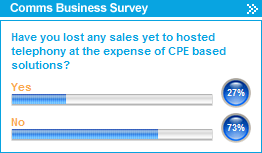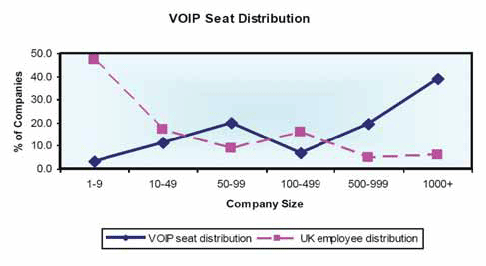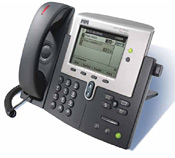
 |
Comms Business Magazine reports on who is buying hosted phone services and talks to one end-user on their experiences with a hosted telephony solution from Voicenet.
The prospect of hosted telephony services displacing traditional CPR-based solutions has occupied the minds of many and has been responsible for so many reported column inches over the last couple of years. But what is the reality? Has the application made any significant impact upon the market or is it all hype?
The truth is... it is hard to know exactly what the true picture is. Analysts such as the highly respected MZA say that it is very difficult to make quantitive judgements as the suppliers are very reluctant to disclose their sales figures.
One company that continues to monitor the hosted/centrex market is Essex-based illume Consulting where Mathew Townend, a former columnist for this magazine and previous holder of senior marketing roles within Pipex and WorldCom, produces an interesting quarterly bulletin for clients.
In the latest edition to their quarterly Convergence Bulletin, illume reveal a significant upturn in the numbers of UK Business users of ‘Centrex style’ VoIP. The bulletin says that with over a 50% growth in just three months, the UK market now stands at over 154,000 users and shows no signs of slowing down.

Illume also took the opportunity to analyse the distribution of this growth, reporting that in addition to some ‘predictable’ large government contracts, the key focus of activity had been within the 50 – 99 ‘seat’ arena. It was noted that relative to perceived opportunity, there had been surprisingly little penetration of the sub-10 seat community.
Matthew Townend illume’s MD says; “After over two years of Centrex service being offered in the UK, we are starting to see real momentum that suggests broad market acceptance.
“It’s a shame that small businesses still are not receiving the benefits that IP Centrex has the potential to offer, but service providers have not built a strong and compelling proposition to this market, cheap minutes are not enough!”
Townend makes some interesting points here so we decided to do some research of our own – albeit not as scientifically based as the pros at illume.
Comms Business Magazine now holds a weekly survey on our web site (www.commsbusiness.co.uk) where we seek simple Yes/No answers to straightforward questions. So, we asked, “Have you lost any sales yet to Hosted Telephony at the expense of CPE based Solutions?”
A resounding 73% of readers reported they had not lost sales to hosted solutions. Resounding? That means that 27% of readers have lost sales to the application. Quite frankly, 27% represents a ‘meltdown’ of the traditional PBX market and along with it, Western civilisation as we know it…
OK, we held a straw poll that drew a fair response – enough people pressed the button for us to be satisfied – and we put the results of the poll to a few interested parties.
David Dadds, managing director at hosted telephony supplier VanillaIP is certainly interested as well as having a vested interest in the market so it was refreshing to hear him say, “27% seems a bit high to me. I wonder if those readers that press the Yes button really realised exactly what they has lost the sale to. Was it really a hosted solution?”
Dadds is equally refreshing about his sales figures and offers us the fact that his company has over 2500 endpoints being billed with customers. He also offers us his view on the endpoints in use with some of his competitors but alas we can’t confirm them.
“It’s important,” says Dadds, “to count only the endpoints that are being billed as that represents the real level of sales. There is no point counting in trial sites that generate no revenue.
With regards to where endpoints are being provided I believe it is well documented via our case studies that VanillaIP has had success across a wide range of customer sectors and sizes. From smaller, less than ten employee organisations, right the way up to hundreds of endpoints on multiple sites such as the Essex Ford implementation which won the Comms Business Magazine Converged Solution Award this year.
The penetration of hosted services into the smaller end of the market has been as high as many people predicted and it is difficult with some customer types to make the case. For example, a straightforward single site user with some 40 employees can be a difficult sale for a hosted solution but once you establish that they would like to implement home or remote working it becomes a no-brainer as the right solution.”
More than a Foothold
 |
by a hosted channel partner making it affordable for organisations of all sizes to access and benefit from the latest IP applications.
“The initial uptake as predicted has been with large retail outlets and pubs, which are taking advantage of online and hosted gaming. There has been less crossover into the large corporate market, however those first to market will gain significant business benefits.
“One of the key reasons for the uptake and success of the hosted space to date is due to better access to Broadband including Wi-Fi and fixed services. Many carriers are deploying robust systems to penetrate this market enabling resellers to take advantage of this opportunity with the price points making it a viable option for many of their clients. This provides not only a great market opportunity for the channel but customers will also benefit from significant cost savings.
“The next stage for Hosted IP telephony is to continue to inform resellers and customers about the added value it affords. Here lies a key opportunity for the channel to pre-manage customer expectations and offer care maintenance during the migration process.
“At Mitel we have in place a key product map which enables us to assist any size of company to migrate to Hosted IP telephony with minimal disruption. This can also help resellers present the business case for upgrading their existing systems to IP telephony and offer other services.
“Once the switch to Hosted IP telephony has been made the possibilities are endless and we have only scratched the surface of what business benefits this could bring for both the channel and its customers. Moving forward organisations need to develop and implement dual strategies to operate both by CPE and Hosted systems if they want to stay ahead of the game.”
SIP Trunking
Specialist VoIP Analyst Company illume has started to track the development of the trunking market and report that out of the providers they spoke to 80% were now offering SIP trunking as part of their portfolio.
“However for most of them it was a very recent addition to the portfolio. Our survey revealed a number of price differences amongst Service Providers, reflecting differing views on ‘how‘ the service should be charged. Nevertheless, a mean average of £4.6/month per trunk rental did emerge. In terms of market numbers there has been a handful of companies who have embraced trunking early, and have therefore made more headway in numbers than others. We estimate the market to be approximately 4,300 trunks.
“illume also expects this figure to grow dramatically, as a number of new providers have added the product to their portfolios. Also from our discussions with providers they are perceiving trunking as an easy sell for some of their traditional PBX channels, and as a bridgehead into certain accounts in order to then sell a hosted solution.”
Voicenet Solutions VoIP for Business Case Study - JISC
JISC is an organisation, which was set up to support higher and further education and research by promoting innovation in new technologies. They do this by managing licences for online resources on behalf of further and higher education and research councils.
JISC manages research and development programmes in the use of ICT in teaching. It also funds initiatives and services to provide expertise, independent advice, guidance and resources to the UK FE and HE education sectors to promote the effective and innovative use of ICT.
Based in Bristol, London and Nottingham, as well as various other locations around the country, JISC is committed to offering superior value to its members by providing affordable and highly relevant online content.
When JISC decided to relocate its London offices to a new building it decided it was the perfect time to implement a new telephone system. This communications solution had to accommodate 52 members of staff who needed to be connected to the network whilst at home as well as travelling internationally.
The Challenge
JISC wanted a reliable, flexible and scaleable option that would allow them to deploy a modern, feature-rich telephony solution throughout their new offices in London to connect staff both in the office and for them to use seamlessly whilst away from their desks.
It was felt that the traditional option of a PBX was cost prohibitive and systems with hardware costs of as much as £50,000 were deemed far too expensive.
Hosted VoIP became the preferred option not just for its cost-effectiveness and leading technology but for its remote servicing and ongoing support.
JISC decided to send out the service for tender. They selected four VoIP service providers, with a mixture of offerings, based on a consultant’s advice, to respond.
What JISC wanted to see from the VoIP providers was a fully operational product that was not only cost-effective but was at the forefront of modern telephony technology and offered features that would enhance employee connectivity. Furthermore JISC stipulated that the product be ready to go straight away, it should have full QoS, and that the level of servicing and support was crucial.
10 Minute Test
 |
Thirdly the level of technology and the array of features available were superior to the other offerings proposed.
Once the decision was made the solution was fully operational within half a day of receiving the hardware. All that was needed was the delivery of the Cisco 7940 IP phones, and once they arrived all employees were allocated their extension numbers and the software was fully operational within hours.
The Outcome
It was felt that if the product could work that effectively in demonstration and to the standard required it was the system JISC could feel confident about.
It is only since the system has been in full use that JISC is able to fully understand the benefits of the Voicenet Solutions hosted VoIP solution both in costs and enhanced connectivity.
Due to the nature of work involved at JISC, employees rely upon and make a large number of conference calls. It is thought that purely on these types of calls the organisation is already saving almost £1000 every month. Plus there is a further monthly saving of over £600 on basic call charges. This saving of course is in addition to that made on opting for a hosted solution negating the need and the expenditure for a proprietary PBX.
Over a five-year period the estimated savings will be:
£60,000 – conference calls
£36,000 – call charges
£40,000 – hardware
Total Savings, 60 months - £136,000
Comment
Comment We’ll let an end-user customer have the final word as he seems to sum up the hosted applications benefits rather well. Yogi Patel, Financial Director, JISC, “The cost-effectiveness and the savings speak for themselves. But there are certain costs that we simply cannot measure. Members of JISC can travel to America, use their Voicenet Solutions soft phone whilst in a hotel and make and receive calls as if they were in the office. They do not need to worry about connectivity or hotel charges. They can speak as if in the office still utilising all the features and making the most of the technology. In this instance, cutting costs does not mean cutting standards. This is a leading technology solution which has enhanced our organisation’s communication connectivity and enabled us to therefore be more productive.”
| illume www.illumeconsulting.co.uk |
| Mitel www.mitel.com |
| VanillaIP www.vanillaip.com |
| Voicenet Solutions www.voicenet-solutions.com |
